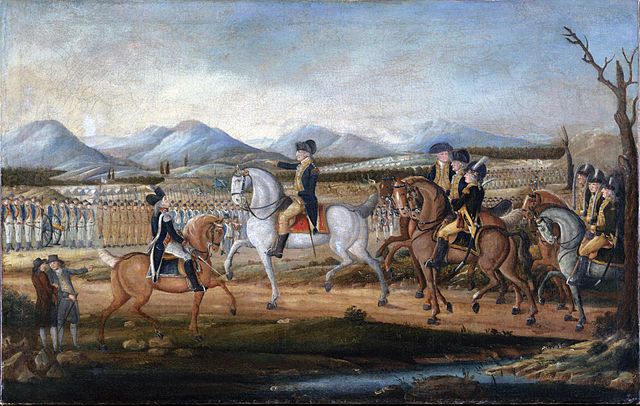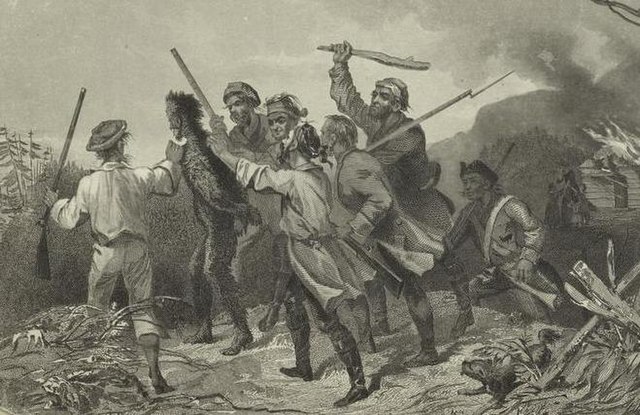Getting frisky
Maybe just pay your taxes, guys

"The party people are over there, you say?" (credit below)
Want a quick history of the Whiskey Rebellion? Here you go:
In 1791, the United States wanted people to pay taxes on whiskey. People didn’t want to pay those taxes. There was almost a war, but then there wasn’t. The end!
As history goes, it may not be the stuff of a Tony-sweeping hip-hop musical1, but it turns out, the whole four-year kerfuffle was pretty important, after all. It has to do with the precedent of federal power, and we’ll get to that. But first, some background.
You can’t enter in a conversation about the Whiskey Rebellion without mentioning federal debt, and emerging from the Revolution, the brand-new baby U.S.A. had a bunch of it—over $70 million in 1790 dollars. Baby America owed that money to France, to Dutch banks, and to domestic creditors, and to add to the issue, the federal government assumed states’ debts.
But astute history students will remember that the Articles of Confederation gave the Continental Congress no power to tax anybody, which: swell. By the time the Constitution was written and ratified, the war debt had ballooned and there was doubt whether the Little Nation That Could would make it at all. Enter our old friend taxes.
Americans hate taxes. We hate them now and they hated them then, and they’d just fought a whole big war about taxes (which exploded the debt, which necessitated the taxes, but we digress), so you can imagine the lack of appetite for them in the nascent States.
Washington’s government came up with the idea of a luxury tax on all distilled spirits. But because the rum trade had been disrupted2 and whiskey production was exploding as the country grew westward, it became known as the “Whiskey Tax.” Every still had to be registered by law, and whiskey producers could pay either a flat fee, or a rate of nine cents per gallon. Like nearly everything else, it was a system stacked against the little guy; big producers could afford the flat rate, which knocked their per-gallon rate way down, while home distillers were stuck paying nine cents per. (That’s $2.49 in 2020 dollars, which doesn’t sound like a whole lot until you realize that yearly wages were about $70.)
Things were further complicated because out on the frontier of the western states, whiskey was currency. Corn and grain were bulky, hard to haul over the Appalachians, and perishable. Whiskey was none of those—thus, many farmers would convert the spare crop into sweet, sweet booze to sell, trade, or get tricorne-hammered on. It was indispensable to people west of the mountains, and frankly pretty dumb for the feds to tax it at the same rate as was applied to the richer cityfolk. But the westerners had a most elegant solution: they just didn’t pay the tax.

Not only did they not pay, they tarred and feathered tax collectors, beat them up, terrorized them, and drove them out of town. They harassed public officials and the distillers who cooperated with them. They blew up stills and burned down houses. Not a red cent of whiskey tax was collected in Kentucky, which earned its statehood a year after the tax was levied, because they simply couldn’t find anybody willing to enforce the law. Other fun forms of protest included:
- Erection of “liberty poles.” Dating back to Roman times, these Smurf-hatted poles were raised in town squares or along roads, basically a big middle finger to the feds and a sign that the town was in rebellion.
- The flying of the Whiskey Rebellion flag. It has all the hits: stars! Eagle! A banner! You can buy one now at AmericanFlags.com.
- In 1793, rebels broke into the house of tax collector Benjamin Wells. He wasn’t home, so they instead beat up his wife and kids. Not cool, whiskey rebels!
This situation presented a problem for the brand-new federal government. They’d fought a war and won and ratified a constitution and formed a government and decided how to run things, and here were these far-flung folks refusing to pay their fair share, like, well … bloody colonials. There were threats by district attorneys, counterthreats by locals, counter-counterthreats by U.S. Marshalls, and then boom: shots fired.
Grumbling and distillery fires became actual armed insurrection in 1794, when the Battle of Bower Hill pitted whiskey rebels against U.S. soldiers. A handful of rebels were killed, including Major James McFarlane, a veteran who’d taken up the cause. The federal troops involved were captured, and the rebels marched on Pittsburgh, intending to burn it to the ground. (They were turned away with a bribe of, duh, whiskey.)
This was a turning point for the new country, the first time their own citizens had defied the authority. It would set a precedent for how insurrections would henceforth be dealt with in the United States, and so begged a dramatic response. And boy howdy, did the feds provide one. Washington personally rode into western Pennsylvania at the head of a column of 13,000 troops. It’s difficult to exaggerate what a big deal this was: the first and last time an American president showed up to personally do battle. It would be akin to George W. Bush yanking Saddam out of his spider-hole himself, or, more aptly, Obama riding out to the Malheur Preserve to slap his chest at the Bundys.3 It was pretty ballsy, an awesome show of force, and the rebels responded accordingly: they all ran away.
A few leaders were rounded up and tried for treason, but at the end of the day, everybody was pardoned and the whiskey tax continued to be levied—and, in many places, continued to be ignored, only without the gun-brandishing and house-burning. Whiskey rebels held onto their gripes, however, and peeled off into the Democratic-Republican party that voted the Federalists out of office and got the tax repealed by 1802. Without the whiskey tax, it’s possible there would have been no such division, no Jefferson-Adams feud, no political parties at all.
So how best to commemorate this important event? Why, at the Whiskey Rebellion Festival, of course, held annually in, ahem, Washington, Pennsylvania.
A version of this story appeared on the news page of Questionist’s parent company, Geeks Who Drink.
Featured image: Unknown, attributed to Frederick Kemmelmeyer, Public domain
1. Actually, it was. Hamilton, the person, was central to the Whiskey Rebellion, the tax having been his damn idea in the first place. Hamilton, the musical, originally featured a song about it. You know that second-act George Washington song “One More Time”? That was originally a reprise; the first “One More Time” commemorated Hamilton and Washington going to war again, you know, for old times’ sake. The song got cut before the Broadway debut.
2. Rum was a centerpiece of the New England colonial economy, as part of the “triangle trade”: slaves were brought from Africa to the West Indies, where sugarcane was grown and molasses produced, molasses was shipped to New England to be made into rum, and that rum (and other manufactured goods) went to Africa to buy more slaves. This whole arrangement fell apart during the war, when smuggling became patriotic, and the rum economy collapsed—an early but certainly not final example of America boning itself in the name of national pride.
3. Remember that whole thing, when a bunch of far-right crazypantses staged a month-long armed occupation of federal property, and they were all either acquitted or sentenced to probation? We’re not sure why, but we’re suddenly reminded that the FBI drugged Black Panther Fred Hampton and shot him while he slept, and locked up Huey P. Newton and locked up Bobby Seale and killed Bobby Hutton and locked up Eddie Conway and killed Mark Clark and killed John Huggins and killed Crazy Horse and killed Sitting Bull and killed Tecumseh and killed Pontiac. Huh.
